Cultural and HRM Issues Faced by UK Companies in Locating Call Centre Operations in Japan
VerifiedAdded on 2023/06/18
|10
|3269
|254
AI Summary
This report discusses the cultural and HRM issues faced by UK companies while locating call centre operations in Japan. It highlights the importance of cultural sensitivity and cumulative skills in dealing with potential challenges and provides recommendations for effective management.
Contribute Materials
Your contribution can guide someone’s learning journey. Share your
documents today.
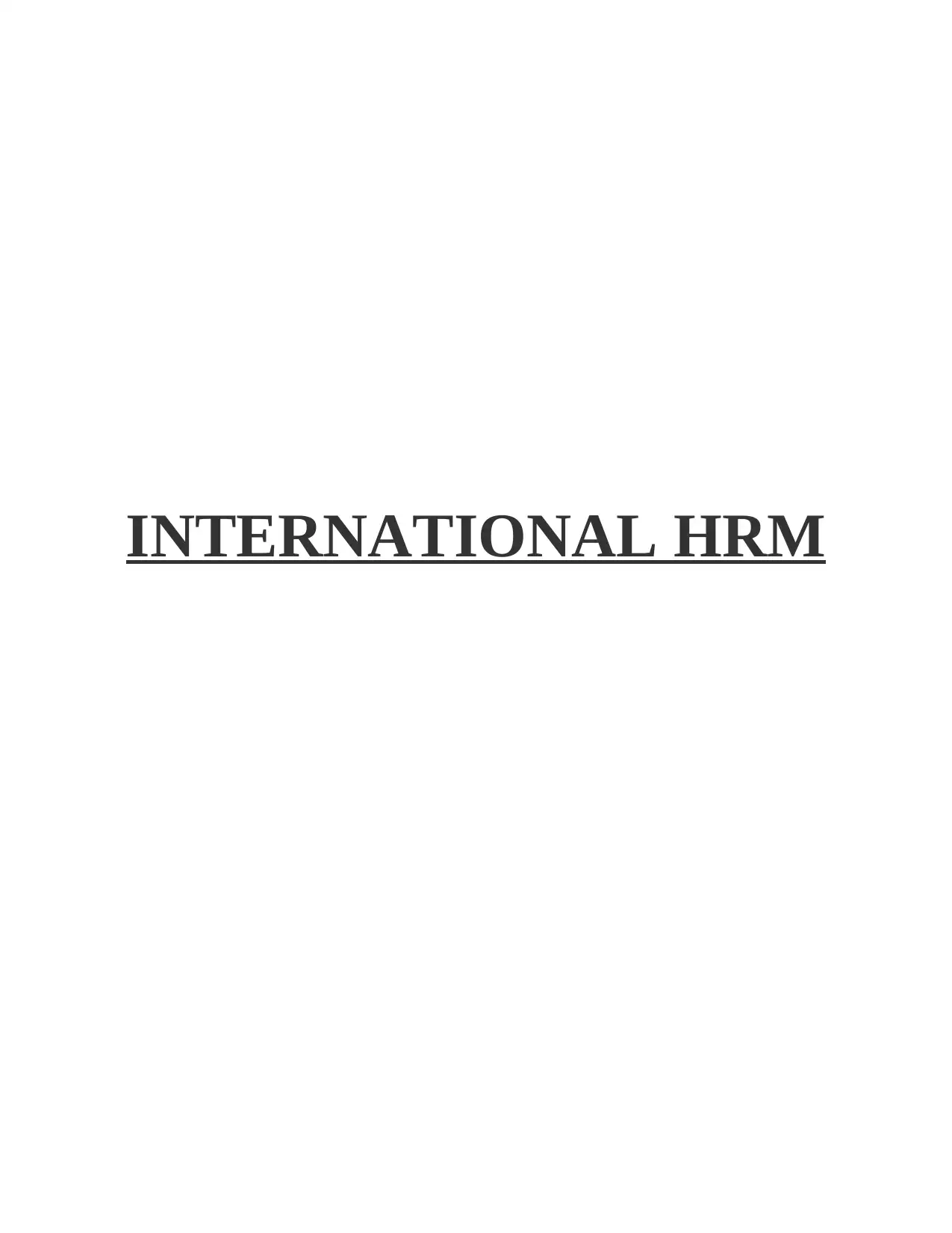
INTERNATIONAL HRM
Secure Best Marks with AI Grader
Need help grading? Try our AI Grader for instant feedback on your assignments.
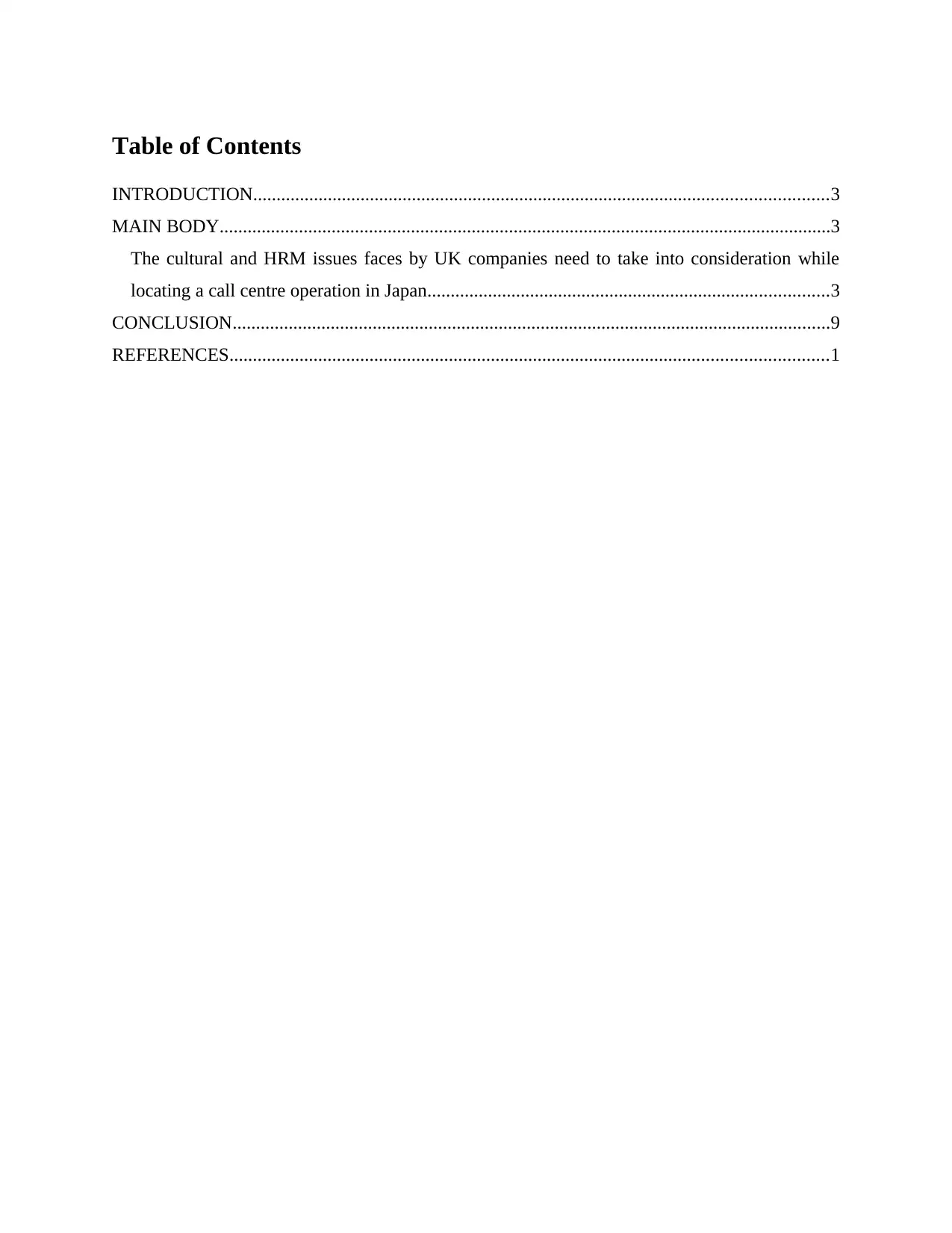
Table of Contents
INTRODUCTION...........................................................................................................................3
MAIN BODY...................................................................................................................................3
The cultural and HRM issues faces by UK companies need to take into consideration while
locating a call centre operation in Japan......................................................................................3
CONCLUSION................................................................................................................................9
REFERENCES................................................................................................................................1
INTRODUCTION...........................................................................................................................3
MAIN BODY...................................................................................................................................3
The cultural and HRM issues faces by UK companies need to take into consideration while
locating a call centre operation in Japan......................................................................................3
CONCLUSION................................................................................................................................9
REFERENCES................................................................................................................................1
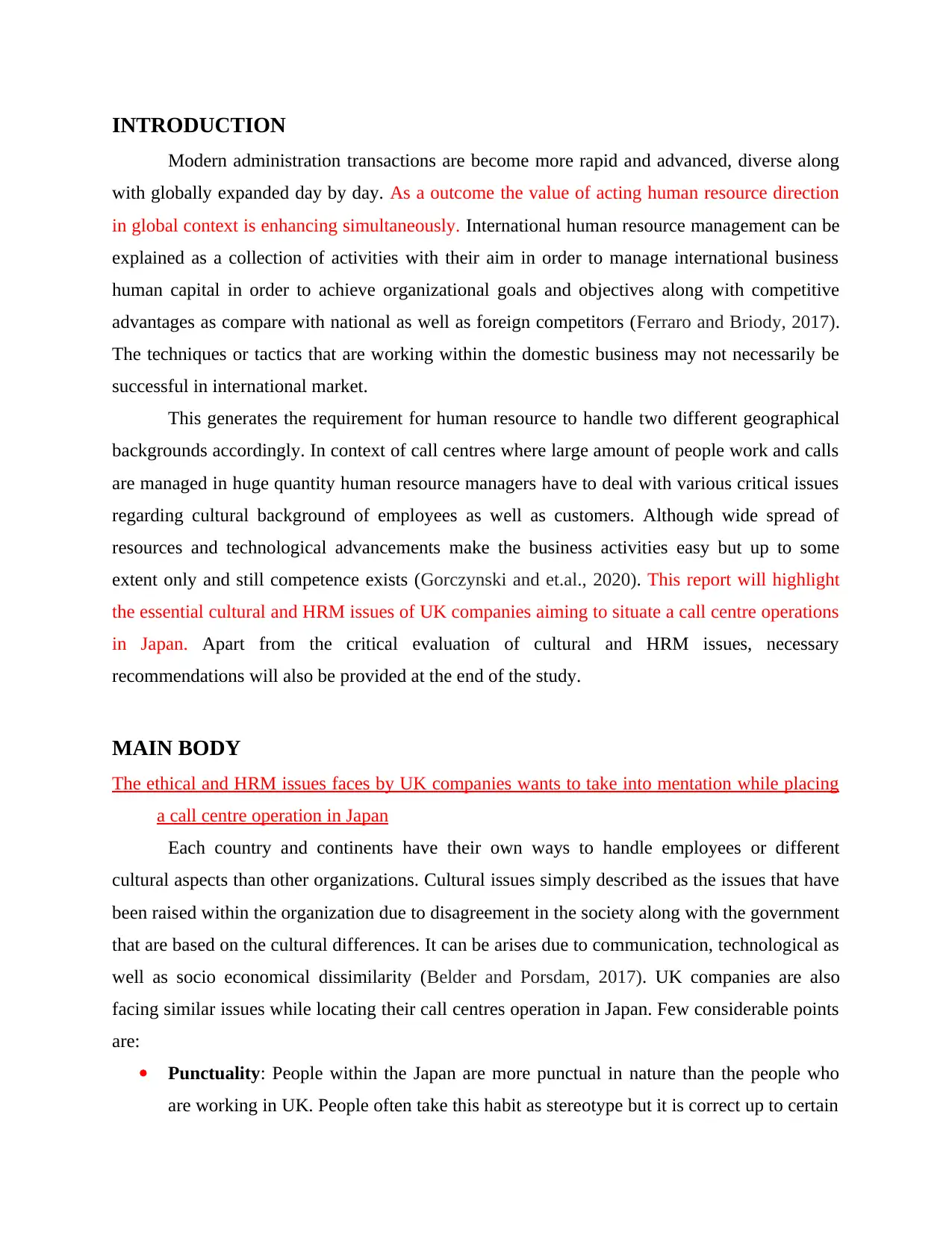
INTRODUCTION
Modern administration transactions are become more rapid and advanced, diverse along
with globally expanded day by day. As a outcome the value of acting human resource direction
in global context is enhancing simultaneously. International human resource management can be
explained as a collection of activities with their aim in order to manage international business
human capital in order to achieve organizational goals and objectives along with competitive
advantages as compare with national as well as foreign competitors (Ferraro and Briody, 2017).
The techniques or tactics that are working within the domestic business may not necessarily be
successful in international market.
This generates the requirement for human resource to handle two different geographical
backgrounds accordingly. In context of call centres where large amount of people work and calls
are managed in huge quantity human resource managers have to deal with various critical issues
regarding cultural background of employees as well as customers. Although wide spread of
resources and technological advancements make the business activities easy but up to some
extent only and still competence exists (Gorczynski and et.al., 2020). This report will highlight
the essential cultural and HRM issues of UK companies aiming to situate a call centre operations
in Japan. Apart from the critical evaluation of cultural and HRM issues, necessary
recommendations will also be provided at the end of the study.
MAIN BODY
The ethical and HRM issues faces by UK companies wants to take into mentation while placing
a call centre operation in Japan
Each country and continents have their own ways to handle employees or different
cultural aspects than other organizations. Cultural issues simply described as the issues that have
been raised within the organization due to disagreement in the society along with the government
that are based on the cultural differences. It can be arises due to communication, technological as
well as socio economical dissimilarity (Belder and Porsdam, 2017). UK companies are also
facing similar issues while locating their call centres operation in Japan. Few considerable points
are:
Punctuality: People within the Japan are more punctual in nature than the people who
are working in UK. People often take this habit as stereotype but it is correct up to certain
Modern administration transactions are become more rapid and advanced, diverse along
with globally expanded day by day. As a outcome the value of acting human resource direction
in global context is enhancing simultaneously. International human resource management can be
explained as a collection of activities with their aim in order to manage international business
human capital in order to achieve organizational goals and objectives along with competitive
advantages as compare with national as well as foreign competitors (Ferraro and Briody, 2017).
The techniques or tactics that are working within the domestic business may not necessarily be
successful in international market.
This generates the requirement for human resource to handle two different geographical
backgrounds accordingly. In context of call centres where large amount of people work and calls
are managed in huge quantity human resource managers have to deal with various critical issues
regarding cultural background of employees as well as customers. Although wide spread of
resources and technological advancements make the business activities easy but up to some
extent only and still competence exists (Gorczynski and et.al., 2020). This report will highlight
the essential cultural and HRM issues of UK companies aiming to situate a call centre operations
in Japan. Apart from the critical evaluation of cultural and HRM issues, necessary
recommendations will also be provided at the end of the study.
MAIN BODY
The ethical and HRM issues faces by UK companies wants to take into mentation while placing
a call centre operation in Japan
Each country and continents have their own ways to handle employees or different
cultural aspects than other organizations. Cultural issues simply described as the issues that have
been raised within the organization due to disagreement in the society along with the government
that are based on the cultural differences. It can be arises due to communication, technological as
well as socio economical dissimilarity (Belder and Porsdam, 2017). UK companies are also
facing similar issues while locating their call centres operation in Japan. Few considerable points
are:
Punctuality: People within the Japan are more punctual in nature than the people who
are working in UK. People often take this habit as stereotype but it is correct up to certain
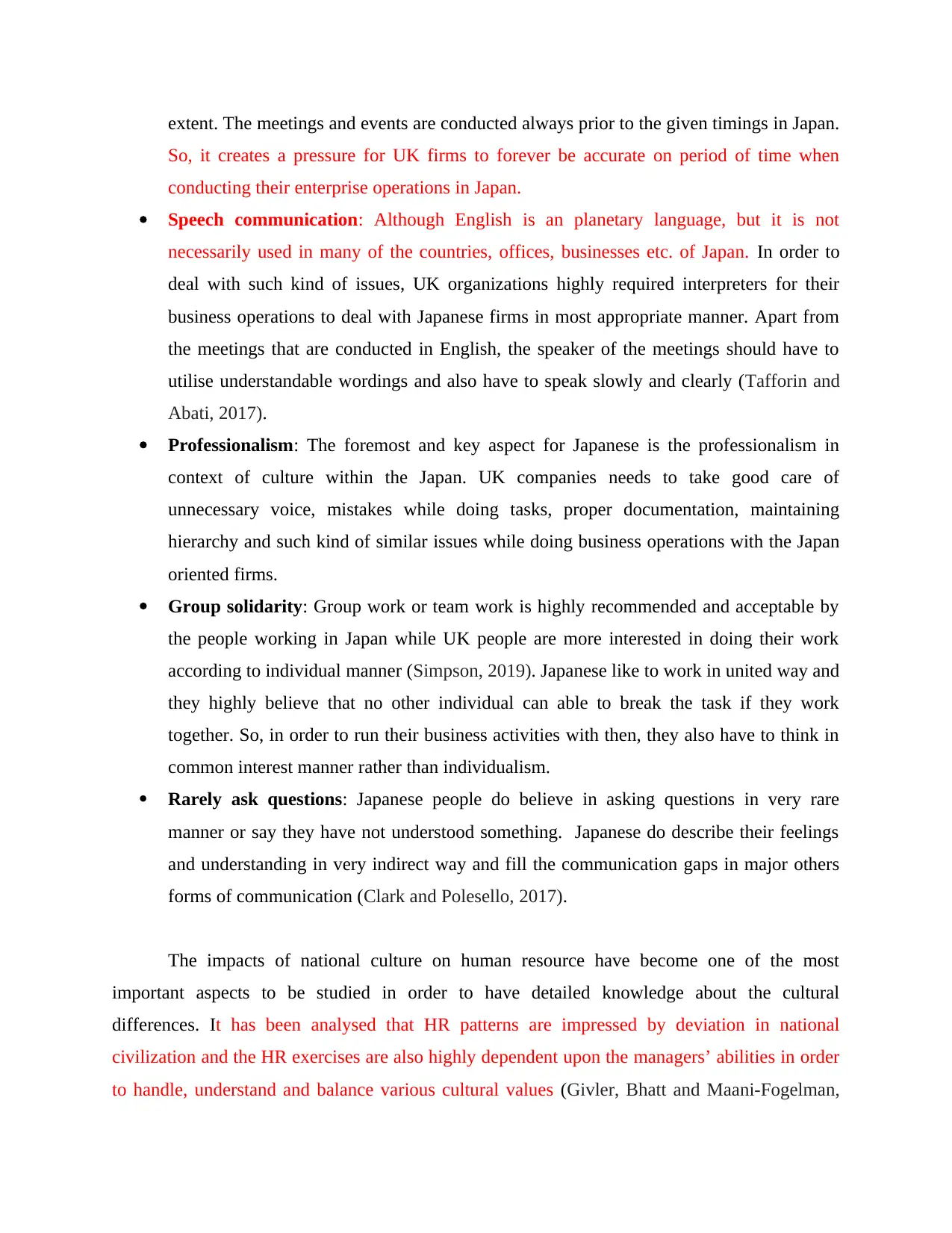
extent. The meetings and events are conducted always prior to the given timings in Japan.
So, it creates a pressure for UK firms to forever be accurate on period of time when
conducting their enterprise operations in Japan.
Speech communication: Although English is an planetary language, but it is not
necessarily used in many of the countries, offices, businesses etc. of Japan. In order to
deal with such kind of issues, UK organizations highly required interpreters for their
business operations to deal with Japanese firms in most appropriate manner. Apart from
the meetings that are conducted in English, the speaker of the meetings should have to
utilise understandable wordings and also have to speak slowly and clearly (Tafforin and
Abati, 2017).
Professionalism: The foremost and key aspect for Japanese is the professionalism in
context of culture within the Japan. UK companies needs to take good care of
unnecessary voice, mistakes while doing tasks, proper documentation, maintaining
hierarchy and such kind of similar issues while doing business operations with the Japan
oriented firms.
Group solidarity: Group work or team work is highly recommended and acceptable by
the people working in Japan while UK people are more interested in doing their work
according to individual manner (Simpson, 2019). Japanese like to work in united way and
they highly believe that no other individual can able to break the task if they work
together. So, in order to run their business activities with then, they also have to think in
common interest manner rather than individualism.
Rarely ask questions: Japanese people do believe in asking questions in very rare
manner or say they have not understood something. Japanese do describe their feelings
and understanding in very indirect way and fill the communication gaps in major others
forms of communication (Clark and Polesello, 2017).
The impacts of national culture on human resource have become one of the most
important aspects to be studied in order to have detailed knowledge about the cultural
differences. It has been analysed that HR patterns are impressed by deviation in national
civilization and the HR exercises are also highly dependent upon the managers’ abilities in order
to handle, understand and balance various cultural values (Givler, Bhatt and Maani-Fogelman,
So, it creates a pressure for UK firms to forever be accurate on period of time when
conducting their enterprise operations in Japan.
Speech communication: Although English is an planetary language, but it is not
necessarily used in many of the countries, offices, businesses etc. of Japan. In order to
deal with such kind of issues, UK organizations highly required interpreters for their
business operations to deal with Japanese firms in most appropriate manner. Apart from
the meetings that are conducted in English, the speaker of the meetings should have to
utilise understandable wordings and also have to speak slowly and clearly (Tafforin and
Abati, 2017).
Professionalism: The foremost and key aspect for Japanese is the professionalism in
context of culture within the Japan. UK companies needs to take good care of
unnecessary voice, mistakes while doing tasks, proper documentation, maintaining
hierarchy and such kind of similar issues while doing business operations with the Japan
oriented firms.
Group solidarity: Group work or team work is highly recommended and acceptable by
the people working in Japan while UK people are more interested in doing their work
according to individual manner (Simpson, 2019). Japanese like to work in united way and
they highly believe that no other individual can able to break the task if they work
together. So, in order to run their business activities with then, they also have to think in
common interest manner rather than individualism.
Rarely ask questions: Japanese people do believe in asking questions in very rare
manner or say they have not understood something. Japanese do describe their feelings
and understanding in very indirect way and fill the communication gaps in major others
forms of communication (Clark and Polesello, 2017).
The impacts of national culture on human resource have become one of the most
important aspects to be studied in order to have detailed knowledge about the cultural
differences. It has been analysed that HR patterns are impressed by deviation in national
civilization and the HR exercises are also highly dependent upon the managers’ abilities in order
to handle, understand and balance various cultural values (Givler, Bhatt and Maani-Fogelman,
Secure Best Marks with AI Grader
Need help grading? Try our AI Grader for instant feedback on your assignments.
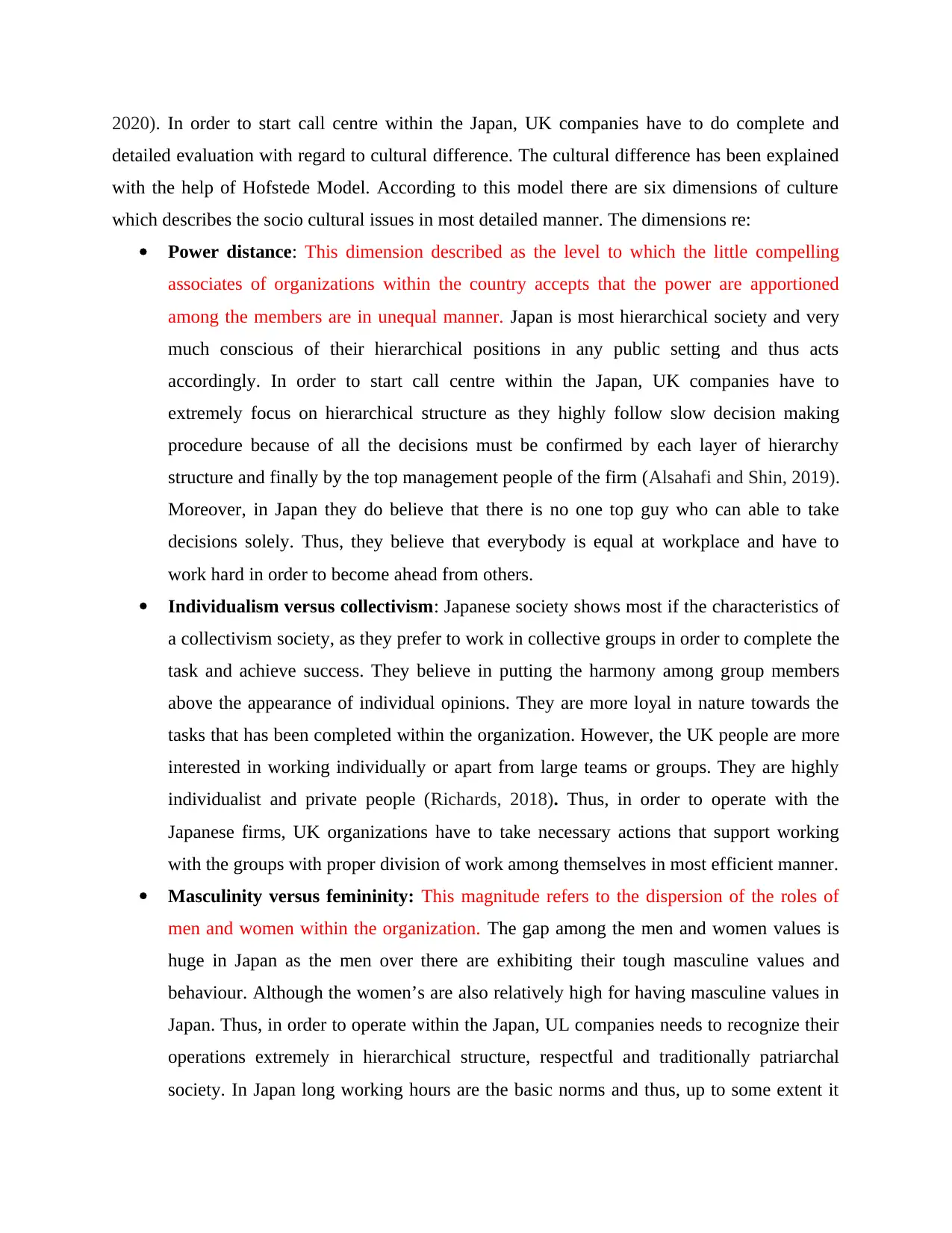
2020). In order to start call centre within the Japan, UK companies have to do complete and
detailed evaluation with regard to cultural difference. The cultural difference has been explained
with the help of Hofstede Model. According to this model there are six dimensions of culture
which describes the socio cultural issues in most detailed manner. The dimensions re:
Power distance: This dimension described as the level to which the little compelling
associates of organizations within the country accepts that the power are apportioned
among the members are in unequal manner. Japan is most hierarchical society and very
much conscious of their hierarchical positions in any public setting and thus acts
accordingly. In order to start call centre within the Japan, UK companies have to
extremely focus on hierarchical structure as they highly follow slow decision making
procedure because of all the decisions must be confirmed by each layer of hierarchy
structure and finally by the top management people of the firm (Alsahafi and Shin, 2019).
Moreover, in Japan they do believe that there is no one top guy who can able to take
decisions solely. Thus, they believe that everybody is equal at workplace and have to
work hard in order to become ahead from others.
Individualism versus collectivism: Japanese society shows most if the characteristics of
a collectivism society, as they prefer to work in collective groups in order to complete the
task and achieve success. They believe in putting the harmony among group members
above the appearance of individual opinions. They are more loyal in nature towards the
tasks that has been completed within the organization. However, the UK people are more
interested in working individually or apart from large teams or groups. They are highly
individualist and private people (Richards, 2018). Thus, in order to operate with the
Japanese firms, UK organizations have to take necessary actions that support working
with the groups with proper division of work among themselves in most efficient manner.
Masculinity versus femininity: This magnitude refers to the dispersion of the roles of
men and women within the organization. The gap among the men and women values is
huge in Japan as the men over there are exhibiting their tough masculine values and
behaviour. Although the women’s are also relatively high for having masculine values in
Japan. Thus, in order to operate within the Japan, UL companies needs to recognize their
operations extremely in hierarchical structure, respectful and traditionally patriarchal
society. In Japan long working hours are the basic norms and thus, up to some extent it
detailed evaluation with regard to cultural difference. The cultural difference has been explained
with the help of Hofstede Model. According to this model there are six dimensions of culture
which describes the socio cultural issues in most detailed manner. The dimensions re:
Power distance: This dimension described as the level to which the little compelling
associates of organizations within the country accepts that the power are apportioned
among the members are in unequal manner. Japan is most hierarchical society and very
much conscious of their hierarchical positions in any public setting and thus acts
accordingly. In order to start call centre within the Japan, UK companies have to
extremely focus on hierarchical structure as they highly follow slow decision making
procedure because of all the decisions must be confirmed by each layer of hierarchy
structure and finally by the top management people of the firm (Alsahafi and Shin, 2019).
Moreover, in Japan they do believe that there is no one top guy who can able to take
decisions solely. Thus, they believe that everybody is equal at workplace and have to
work hard in order to become ahead from others.
Individualism versus collectivism: Japanese society shows most if the characteristics of
a collectivism society, as they prefer to work in collective groups in order to complete the
task and achieve success. They believe in putting the harmony among group members
above the appearance of individual opinions. They are more loyal in nature towards the
tasks that has been completed within the organization. However, the UK people are more
interested in working individually or apart from large teams or groups. They are highly
individualist and private people (Richards, 2018). Thus, in order to operate with the
Japanese firms, UK organizations have to take necessary actions that support working
with the groups with proper division of work among themselves in most efficient manner.
Masculinity versus femininity: This magnitude refers to the dispersion of the roles of
men and women within the organization. The gap among the men and women values is
huge in Japan as the men over there are exhibiting their tough masculine values and
behaviour. Although the women’s are also relatively high for having masculine values in
Japan. Thus, in order to operate within the Japan, UL companies needs to recognize their
operations extremely in hierarchical structure, respectful and traditionally patriarchal
society. In Japan long working hours are the basic norms and thus, up to some extent it
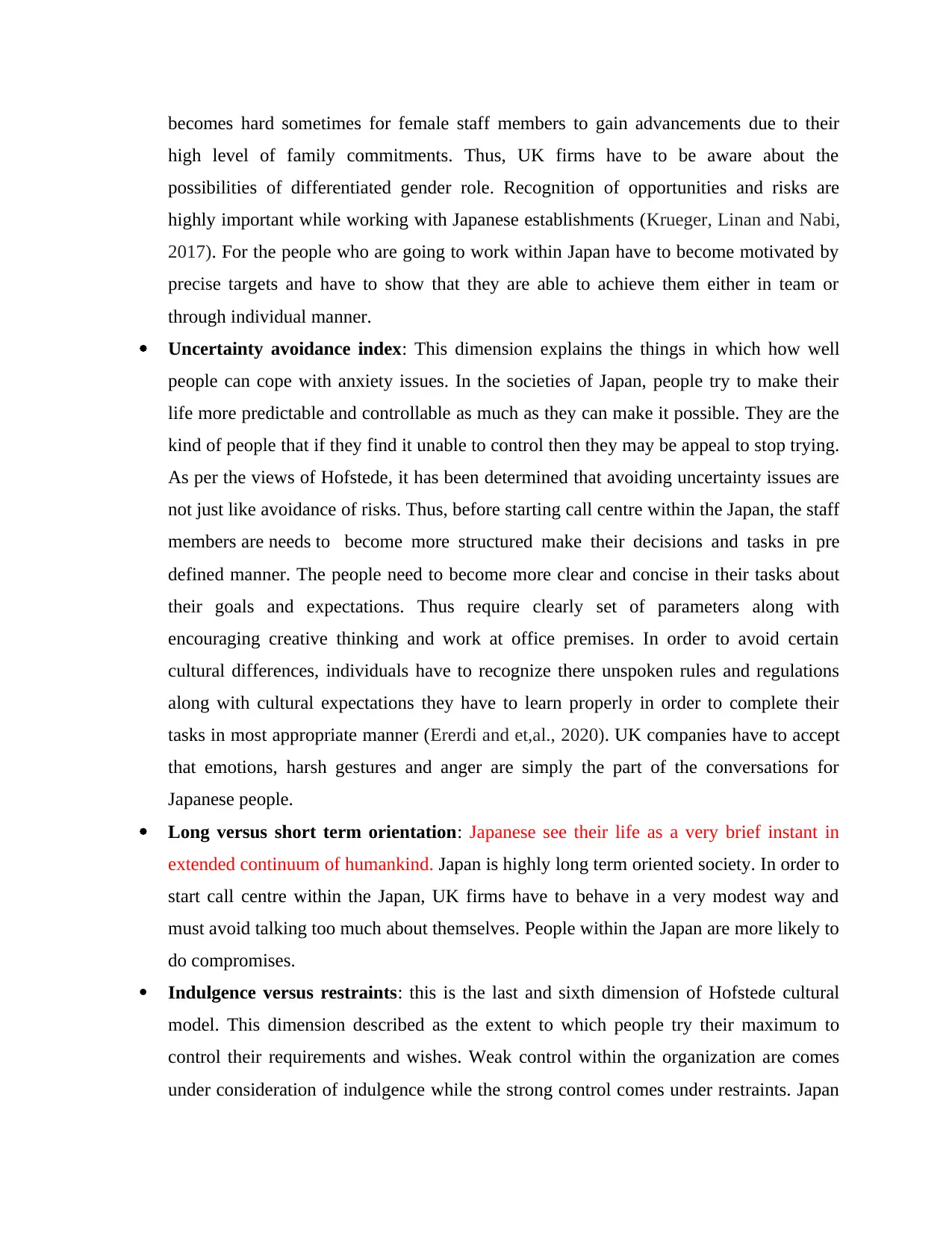
becomes hard sometimes for female staff members to gain advancements due to their
high level of family commitments. Thus, UK firms have to be aware about the
possibilities of differentiated gender role. Recognition of opportunities and risks are
highly important while working with Japanese establishments (Krueger, Linan and Nabi,
2017). For the people who are going to work within Japan have to become motivated by
precise targets and have to show that they are able to achieve them either in team or
through individual manner.
Uncertainty avoidance index: This dimension explains the things in which how well
people can cope with anxiety issues. In the societies of Japan, people try to make their
life more predictable and controllable as much as they can make it possible. They are the
kind of people that if they find it unable to control then they may be appeal to stop trying.
As per the views of Hofstede, it has been determined that avoiding uncertainty issues are
not just like avoidance of risks. Thus, before starting call centre within the Japan, the staff
members are needs to become more structured make their decisions and tasks in pre
defined manner. The people need to become more clear and concise in their tasks about
their goals and expectations. Thus require clearly set of parameters along with
encouraging creative thinking and work at office premises. In order to avoid certain
cultural differences, individuals have to recognize there unspoken rules and regulations
along with cultural expectations they have to learn properly in order to complete their
tasks in most appropriate manner (Ererdi and et,al., 2020). UK companies have to accept
that emotions, harsh gestures and anger are simply the part of the conversations for
Japanese people.
Long versus short term orientation: Japanese see their life as a very brief instant in
extended continuum of humankind. Japan is highly long term oriented society. In order to
start call centre within the Japan, UK firms have to behave in a very modest way and
must avoid talking too much about themselves. People within the Japan are more likely to
do compromises.
Indulgence versus restraints: this is the last and sixth dimension of Hofstede cultural
model. This dimension described as the extent to which people try their maximum to
control their requirements and wishes. Weak control within the organization are comes
under consideration of indulgence while the strong control comes under restraints. Japan
high level of family commitments. Thus, UK firms have to be aware about the
possibilities of differentiated gender role. Recognition of opportunities and risks are
highly important while working with Japanese establishments (Krueger, Linan and Nabi,
2017). For the people who are going to work within Japan have to become motivated by
precise targets and have to show that they are able to achieve them either in team or
through individual manner.
Uncertainty avoidance index: This dimension explains the things in which how well
people can cope with anxiety issues. In the societies of Japan, people try to make their
life more predictable and controllable as much as they can make it possible. They are the
kind of people that if they find it unable to control then they may be appeal to stop trying.
As per the views of Hofstede, it has been determined that avoiding uncertainty issues are
not just like avoidance of risks. Thus, before starting call centre within the Japan, the staff
members are needs to become more structured make their decisions and tasks in pre
defined manner. The people need to become more clear and concise in their tasks about
their goals and expectations. Thus require clearly set of parameters along with
encouraging creative thinking and work at office premises. In order to avoid certain
cultural differences, individuals have to recognize there unspoken rules and regulations
along with cultural expectations they have to learn properly in order to complete their
tasks in most appropriate manner (Ererdi and et,al., 2020). UK companies have to accept
that emotions, harsh gestures and anger are simply the part of the conversations for
Japanese people.
Long versus short term orientation: Japanese see their life as a very brief instant in
extended continuum of humankind. Japan is highly long term oriented society. In order to
start call centre within the Japan, UK firms have to behave in a very modest way and
must avoid talking too much about themselves. People within the Japan are more likely to
do compromises.
Indulgence versus restraints: this is the last and sixth dimension of Hofstede cultural
model. This dimension described as the extent to which people try their maximum to
control their requirements and wishes. Weak control within the organization are comes
under consideration of indulgence while the strong control comes under restraints. Japan
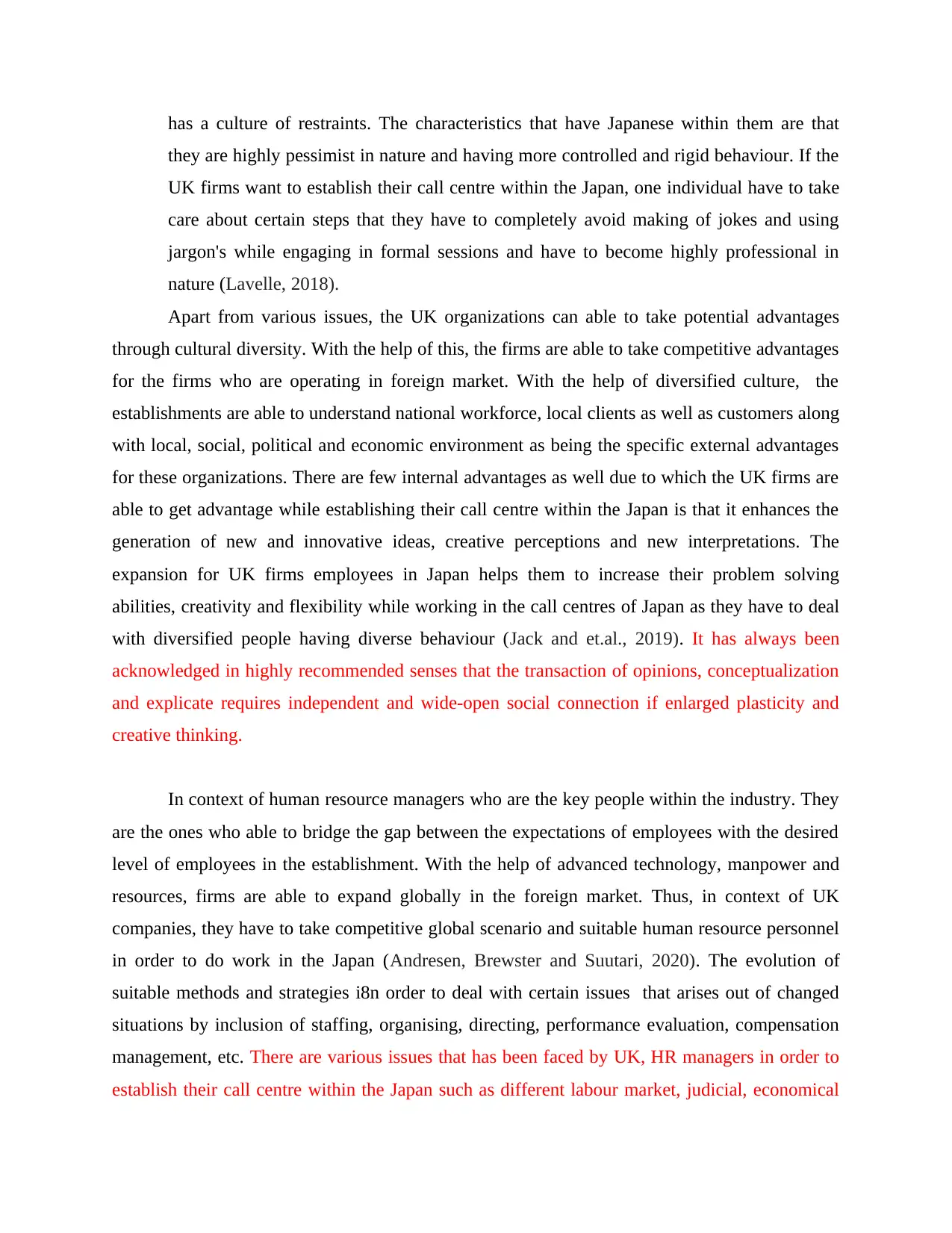
has a culture of restraints. The characteristics that have Japanese within them are that
they are highly pessimist in nature and having more controlled and rigid behaviour. If the
UK firms want to establish their call centre within the Japan, one individual have to take
care about certain steps that they have to completely avoid making of jokes and using
jargon's while engaging in formal sessions and have to become highly professional in
nature (Lavelle, 2018).
Apart from various issues, the UK organizations can able to take potential advantages
through cultural diversity. With the help of this, the firms are able to take competitive advantages
for the firms who are operating in foreign market. With the help of diversified culture, the
establishments are able to understand national workforce, local clients as well as customers along
with local, social, political and economic environment as being the specific external advantages
for these organizations. There are few internal advantages as well due to which the UK firms are
able to get advantage while establishing their call centre within the Japan is that it enhances the
generation of new and innovative ideas, creative perceptions and new interpretations. The
expansion for UK firms employees in Japan helps them to increase their problem solving
abilities, creativity and flexibility while working in the call centres of Japan as they have to deal
with diversified people having diverse behaviour (Jack and et.al., 2019). It has always been
acknowledged in highly recommended senses that the transaction of opinions, conceptualization
and explicate requires independent and wide-open social connection if enlarged plasticity and
creative thinking.
In context of human resource managers who are the key people within the industry. They
are the ones who able to bridge the gap between the expectations of employees with the desired
level of employees in the establishment. With the help of advanced technology, manpower and
resources, firms are able to expand globally in the foreign market. Thus, in context of UK
companies, they have to take competitive global scenario and suitable human resource personnel
in order to do work in the Japan (Andresen, Brewster and Suutari, 2020). The evolution of
suitable methods and strategies i8n order to deal with certain issues that arises out of changed
situations by inclusion of staffing, organising, directing, performance evaluation, compensation
management, etc. There are various issues that has been faced by UK, HR managers in order to
establish their call centre within the Japan such as different labour market, judicial, economical
they are highly pessimist in nature and having more controlled and rigid behaviour. If the
UK firms want to establish their call centre within the Japan, one individual have to take
care about certain steps that they have to completely avoid making of jokes and using
jargon's while engaging in formal sessions and have to become highly professional in
nature (Lavelle, 2018).
Apart from various issues, the UK organizations can able to take potential advantages
through cultural diversity. With the help of this, the firms are able to take competitive advantages
for the firms who are operating in foreign market. With the help of diversified culture, the
establishments are able to understand national workforce, local clients as well as customers along
with local, social, political and economic environment as being the specific external advantages
for these organizations. There are few internal advantages as well due to which the UK firms are
able to get advantage while establishing their call centre within the Japan is that it enhances the
generation of new and innovative ideas, creative perceptions and new interpretations. The
expansion for UK firms employees in Japan helps them to increase their problem solving
abilities, creativity and flexibility while working in the call centres of Japan as they have to deal
with diversified people having diverse behaviour (Jack and et.al., 2019). It has always been
acknowledged in highly recommended senses that the transaction of opinions, conceptualization
and explicate requires independent and wide-open social connection if enlarged plasticity and
creative thinking.
In context of human resource managers who are the key people within the industry. They
are the ones who able to bridge the gap between the expectations of employees with the desired
level of employees in the establishment. With the help of advanced technology, manpower and
resources, firms are able to expand globally in the foreign market. Thus, in context of UK
companies, they have to take competitive global scenario and suitable human resource personnel
in order to do work in the Japan (Andresen, Brewster and Suutari, 2020). The evolution of
suitable methods and strategies i8n order to deal with certain issues that arises out of changed
situations by inclusion of staffing, organising, directing, performance evaluation, compensation
management, etc. There are various issues that has been faced by UK, HR managers in order to
establish their call centre within the Japan such as different labour market, judicial, economical
Paraphrase This Document
Need a fresh take? Get an instant paraphrase of this document with our AI Paraphraser
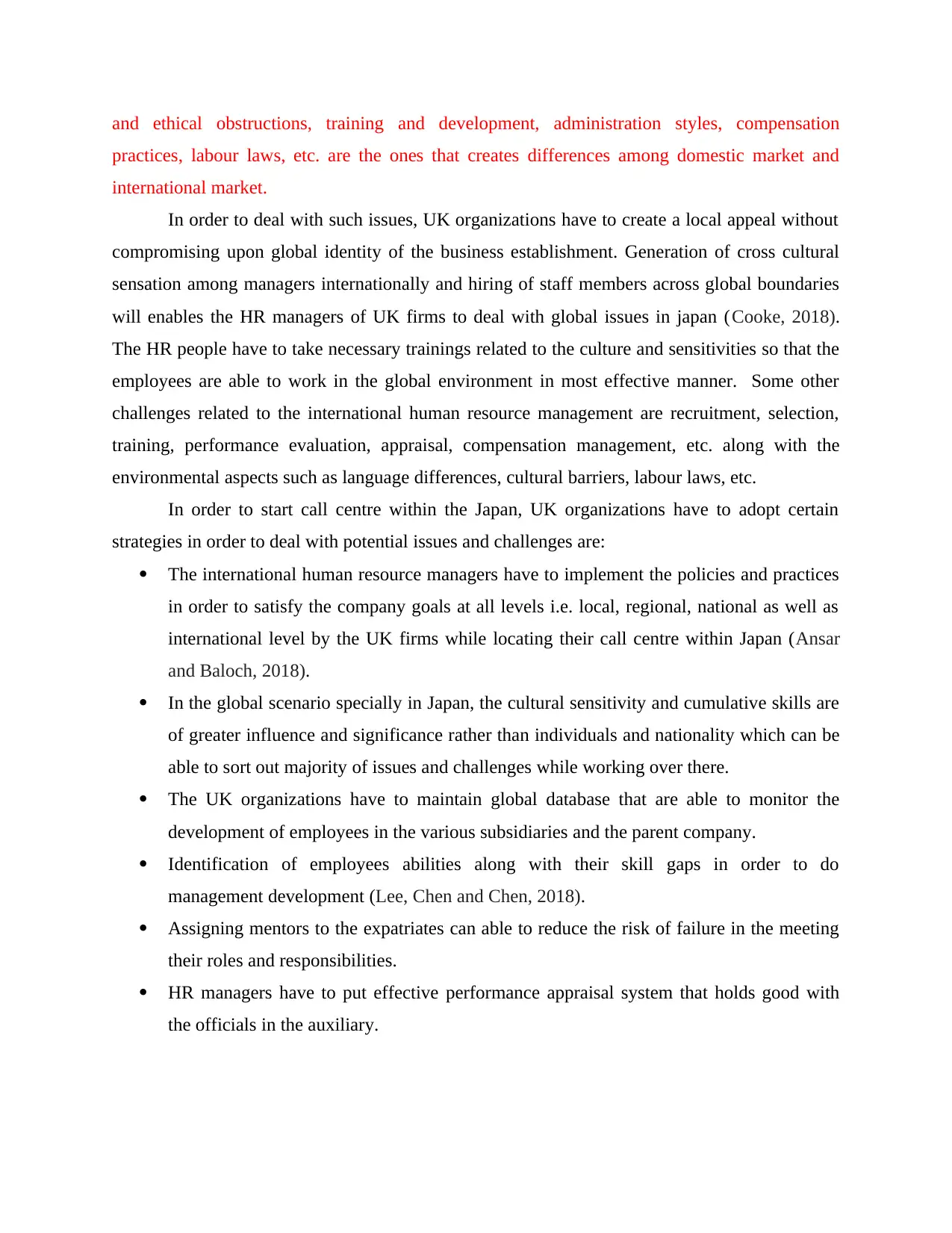
and ethical obstructions, training and development, administration styles, compensation
practices, labour laws, etc. are the ones that creates differences among domestic market and
international market.
In order to deal with such issues, UK organizations have to create a local appeal without
compromising upon global identity of the business establishment. Generation of cross cultural
sensation among managers internationally and hiring of staff members across global boundaries
will enables the HR managers of UK firms to deal with global issues in japan (Cooke, 2018).
The HR people have to take necessary trainings related to the culture and sensitivities so that the
employees are able to work in the global environment in most effective manner. Some other
challenges related to the international human resource management are recruitment, selection,
training, performance evaluation, appraisal, compensation management, etc. along with the
environmental aspects such as language differences, cultural barriers, labour laws, etc.
In order to start call centre within the Japan, UK organizations have to adopt certain
strategies in order to deal with potential issues and challenges are:
The international human resource managers have to implement the policies and practices
in order to satisfy the company goals at all levels i.e. local, regional, national as well as
international level by the UK firms while locating their call centre within Japan (Ansar
and Baloch, 2018).
In the global scenario specially in Japan, the cultural sensitivity and cumulative skills are
of greater influence and significance rather than individuals and nationality which can be
able to sort out majority of issues and challenges while working over there.
The UK organizations have to maintain global database that are able to monitor the
development of employees in the various subsidiaries and the parent company.
Identification of employees abilities along with their skill gaps in order to do
management development (Lee, Chen and Chen, 2018).
Assigning mentors to the expatriates can able to reduce the risk of failure in the meeting
their roles and responsibilities.
HR managers have to put effective performance appraisal system that holds good with
the officials in the auxiliary.
practices, labour laws, etc. are the ones that creates differences among domestic market and
international market.
In order to deal with such issues, UK organizations have to create a local appeal without
compromising upon global identity of the business establishment. Generation of cross cultural
sensation among managers internationally and hiring of staff members across global boundaries
will enables the HR managers of UK firms to deal with global issues in japan (Cooke, 2018).
The HR people have to take necessary trainings related to the culture and sensitivities so that the
employees are able to work in the global environment in most effective manner. Some other
challenges related to the international human resource management are recruitment, selection,
training, performance evaluation, appraisal, compensation management, etc. along with the
environmental aspects such as language differences, cultural barriers, labour laws, etc.
In order to start call centre within the Japan, UK organizations have to adopt certain
strategies in order to deal with potential issues and challenges are:
The international human resource managers have to implement the policies and practices
in order to satisfy the company goals at all levels i.e. local, regional, national as well as
international level by the UK firms while locating their call centre within Japan (Ansar
and Baloch, 2018).
In the global scenario specially in Japan, the cultural sensitivity and cumulative skills are
of greater influence and significance rather than individuals and nationality which can be
able to sort out majority of issues and challenges while working over there.
The UK organizations have to maintain global database that are able to monitor the
development of employees in the various subsidiaries and the parent company.
Identification of employees abilities along with their skill gaps in order to do
management development (Lee, Chen and Chen, 2018).
Assigning mentors to the expatriates can able to reduce the risk of failure in the meeting
their roles and responsibilities.
HR managers have to put effective performance appraisal system that holds good with
the officials in the auxiliary.
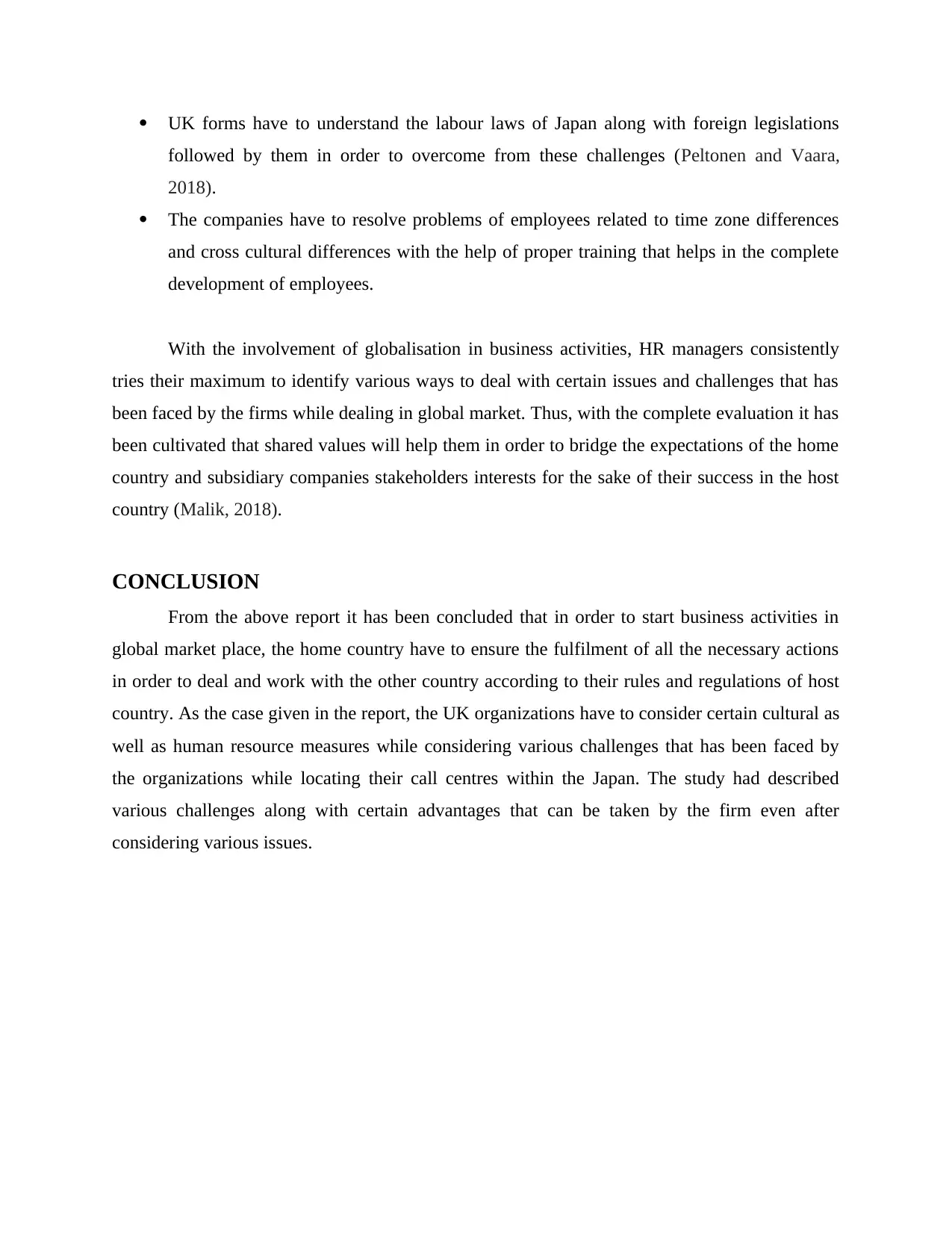
UK forms have to understand the labour laws of Japan along with foreign legislations
followed by them in order to overcome from these challenges (Peltonen and Vaara,
2018).
The companies have to resolve problems of employees related to time zone differences
and cross cultural differences with the help of proper training that helps in the complete
development of employees.
With the involvement of globalisation in business activities, HR managers consistently
tries their maximum to identify various ways to deal with certain issues and challenges that has
been faced by the firms while dealing in global market. Thus, with the complete evaluation it has
been cultivated that shared values will help them in order to bridge the expectations of the home
country and subsidiary companies stakeholders interests for the sake of their success in the host
country (Malik, 2018).
CONCLUSION
From the above report it has been concluded that in order to start business activities in
global market place, the home country have to ensure the fulfilment of all the necessary actions
in order to deal and work with the other country according to their rules and regulations of host
country. As the case given in the report, the UK organizations have to consider certain cultural as
well as human resource measures while considering various challenges that has been faced by
the organizations while locating their call centres within the Japan. The study had described
various challenges along with certain advantages that can be taken by the firm even after
considering various issues.
followed by them in order to overcome from these challenges (Peltonen and Vaara,
2018).
The companies have to resolve problems of employees related to time zone differences
and cross cultural differences with the help of proper training that helps in the complete
development of employees.
With the involvement of globalisation in business activities, HR managers consistently
tries their maximum to identify various ways to deal with certain issues and challenges that has
been faced by the firms while dealing in global market. Thus, with the complete evaluation it has
been cultivated that shared values will help them in order to bridge the expectations of the home
country and subsidiary companies stakeholders interests for the sake of their success in the host
country (Malik, 2018).
CONCLUSION
From the above report it has been concluded that in order to start business activities in
global market place, the home country have to ensure the fulfilment of all the necessary actions
in order to deal and work with the other country according to their rules and regulations of host
country. As the case given in the report, the UK organizations have to consider certain cultural as
well as human resource measures while considering various challenges that has been faced by
the organizations while locating their call centres within the Japan. The study had described
various challenges along with certain advantages that can be taken by the firm even after
considering various issues.
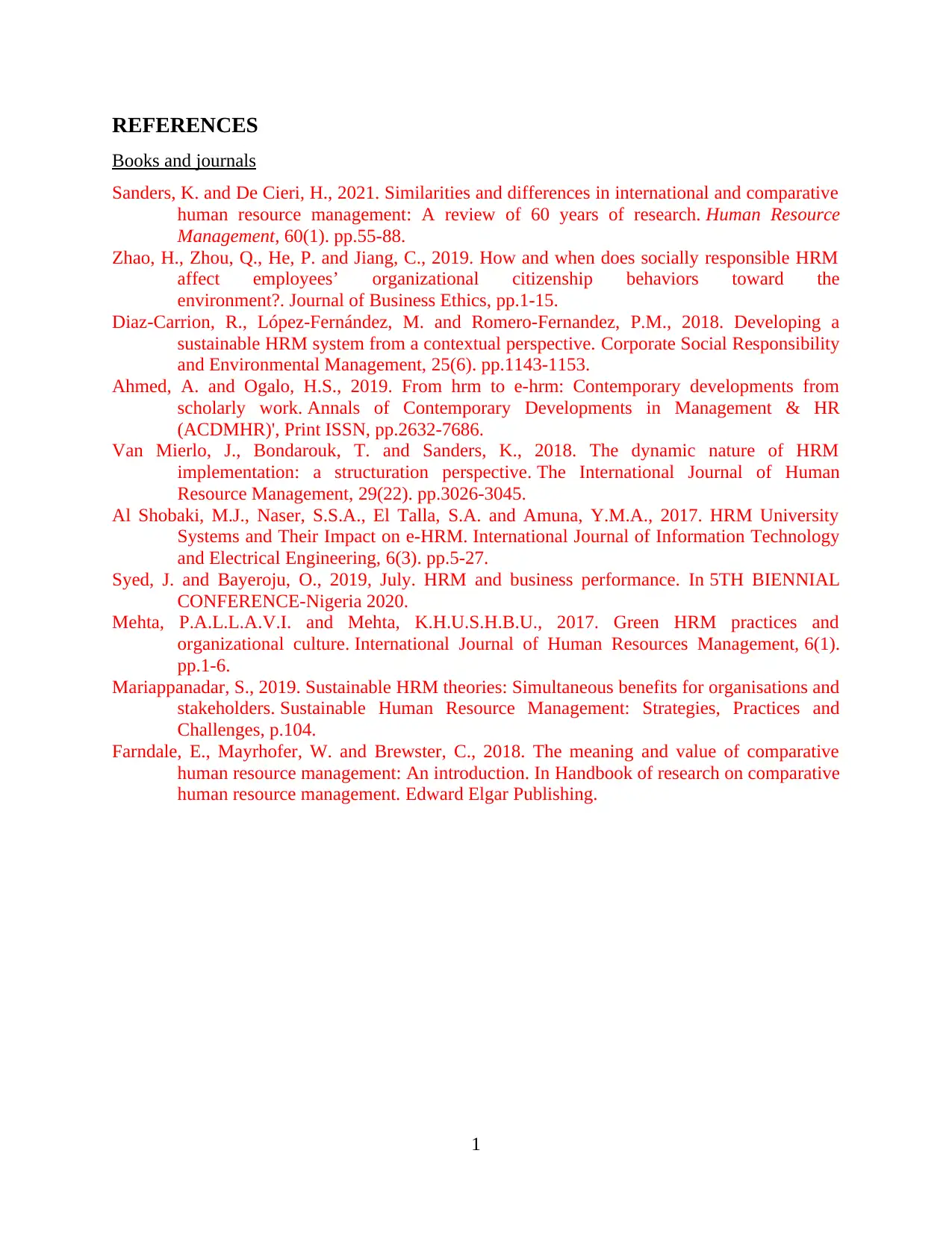
REFERENCES
Books and journals
Sanders, K. and De Cieri, H., 2021. Similarities and differences in international and comparative
human resource management: A review of 60 years of research. Human Resource
Management, 60(1). pp.55-88.
Zhao, H., Zhou, Q., He, P. and Jiang, C., 2019. How and when does socially responsible HRM
affect employees’ organizational citizenship behaviors toward the
environment?. Journal of Business Ethics, pp.1-15.
Diaz‐Carrion, R., López‐Fernández, M. and Romero‐Fernandez, P.M., 2018. Developing a
sustainable HRM system from a contextual perspective. Corporate Social Responsibility
and Environmental Management, 25(6). pp.1143-1153.
Ahmed, A. and Ogalo, H.S., 2019. From hrm to e-hrm: Contemporary developments from
scholarly work. Annals of Contemporary Developments in Management & HR
(ACDMHR)', Print ISSN, pp.2632-7686.
Van Mierlo, J., Bondarouk, T. and Sanders, K., 2018. The dynamic nature of HRM
implementation: a structuration perspective. The International Journal of Human
Resource Management, 29(22). pp.3026-3045.
Al Shobaki, M.J., Naser, S.S.A., El Talla, S.A. and Amuna, Y.M.A., 2017. HRM University
Systems and Their Impact on e-HRM. International Journal of Information Technology
and Electrical Engineering, 6(3). pp.5-27.
Syed, J. and Bayeroju, O., 2019, July. HRM and business performance. In 5TH BIENNIAL
CONFERENCE-Nigeria 2020.
Mehta, P.A.L.L.A.V.I. and Mehta, K.H.U.S.H.B.U., 2017. Green HRM practices and
organizational culture. International Journal of Human Resources Management, 6(1).
pp.1-6.
Mariappanadar, S., 2019. Sustainable HRM theories: Simultaneous benefits for organisations and
stakeholders. Sustainable Human Resource Management: Strategies, Practices and
Challenges, p.104.
Farndale, E., Mayrhofer, W. and Brewster, C., 2018. The meaning and value of comparative
human resource management: An introduction. In Handbook of research on comparative
human resource management. Edward Elgar Publishing.
1
Books and journals
Sanders, K. and De Cieri, H., 2021. Similarities and differences in international and comparative
human resource management: A review of 60 years of research. Human Resource
Management, 60(1). pp.55-88.
Zhao, H., Zhou, Q., He, P. and Jiang, C., 2019. How and when does socially responsible HRM
affect employees’ organizational citizenship behaviors toward the
environment?. Journal of Business Ethics, pp.1-15.
Diaz‐Carrion, R., López‐Fernández, M. and Romero‐Fernandez, P.M., 2018. Developing a
sustainable HRM system from a contextual perspective. Corporate Social Responsibility
and Environmental Management, 25(6). pp.1143-1153.
Ahmed, A. and Ogalo, H.S., 2019. From hrm to e-hrm: Contemporary developments from
scholarly work. Annals of Contemporary Developments in Management & HR
(ACDMHR)', Print ISSN, pp.2632-7686.
Van Mierlo, J., Bondarouk, T. and Sanders, K., 2018. The dynamic nature of HRM
implementation: a structuration perspective. The International Journal of Human
Resource Management, 29(22). pp.3026-3045.
Al Shobaki, M.J., Naser, S.S.A., El Talla, S.A. and Amuna, Y.M.A., 2017. HRM University
Systems and Their Impact on e-HRM. International Journal of Information Technology
and Electrical Engineering, 6(3). pp.5-27.
Syed, J. and Bayeroju, O., 2019, July. HRM and business performance. In 5TH BIENNIAL
CONFERENCE-Nigeria 2020.
Mehta, P.A.L.L.A.V.I. and Mehta, K.H.U.S.H.B.U., 2017. Green HRM practices and
organizational culture. International Journal of Human Resources Management, 6(1).
pp.1-6.
Mariappanadar, S., 2019. Sustainable HRM theories: Simultaneous benefits for organisations and
stakeholders. Sustainable Human Resource Management: Strategies, Practices and
Challenges, p.104.
Farndale, E., Mayrhofer, W. and Brewster, C., 2018. The meaning and value of comparative
human resource management: An introduction. In Handbook of research on comparative
human resource management. Edward Elgar Publishing.
1
1 out of 10
Related Documents
Your All-in-One AI-Powered Toolkit for Academic Success.
+13062052269
info@desklib.com
Available 24*7 on WhatsApp / Email
![[object Object]](/_next/static/media/star-bottom.7253800d.svg)
Unlock your academic potential
© 2024 | Zucol Services PVT LTD | All rights reserved.




